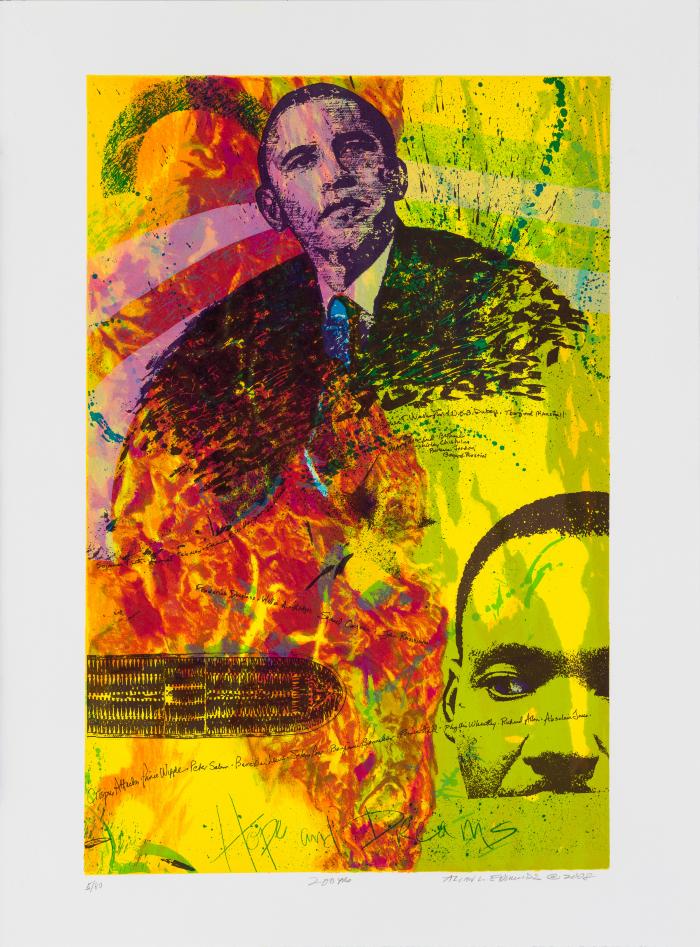
200 Yrs
Allan Edmunds
- 2008
- Offset Lithograph
- Image/sheet: 22 x 30"
- 80 prints in this edition
About the Print
This print celebrates the election of Barack Obama as the first Black and 44th president of the United States. It also pays homage to all the exceptional and courageous people who
preceded Obama and made his election possible two hundred years after the Slave Act of 1808 which — while not abolishing slavery — prohibited new importation of enslaved Africans directly to the U.S. From slavery to Lincoln, Gandhi, King, Mandela, Obama, and the
Arab Spring—global movements inspired nonviolent protests against racism, economic oppression, and militarism. In this way, these movements are connected across generations.
From the Artist
This print celebrates the historic election of Barack Obama in 2008 as president of the United States and traces the legacy created by others and their work in advancing the African American community in the U.S., 200 years after the Slave Act of 1808, which was placed in the Constitution to create a 20-year waiting period before the presence of African slaves would be acknowledged in the U.S.
In order to get slave states’ approval of the Constitution, in 1808 it was agreed that the U.S. would no longer accept slaves directly “imported” from Africa, which resulted in slave ships subverting this law by changing their manifest to suggest slaves (their cargo) were imported from the Caribbean after a stop-over for this purpose in countries such as Cuba.
Within the print image there’s the iconic image of the slave ship in which Africans were packed in to maximize cargo hold capacity. Martin Luther King’s dream and Obama’s legacy of hope were possible because of the triumphs of those who came before them in the struggle for civil rights and social justice, including key orators, writers-authors, academics, community leaders, and politicians.
—From Brandywine Workshop and Archives recordsMy art usually incorporates photographs, primarily from family albums, historical archives, and media arranged as a montage with scale, marks, colors, and spatial arrangements that evoke a sense of movement and time. Subjects reference the family/ ancestry, African American history, and injustice as a global concern of my art/documentation projects.
—From Brandywine Workshop and Archives records
About the Artist
Philadelphia native Allan L. Edmunds earned his BFA and MFA at Temple University’s Tyler School of Art and Architecture, Philadelphia, and is the founder of Brandywine Workshop and Archives.
Edmunds’ priorities have always been education and mentoring young adults as well as advancing multiculturalism in the art world at the highest level—locally, nationally, and internationally—through art education and art creation in collaborative settings. For him, the highest form of creativity occurs when an artist creates something that expresses their authentic experience or viewpoint in a way that others understand and value.
Edmunds’ art is included in the permanent collections of the African American Museum in Philadelphia; Renwick Gallery at the Smithsonian American Art Museum, Washington, DC; Philadelphia Museum of Art; Harvard University Museums, Cambridge, MA; University of Texas, Austin; and Pennsylvania Academy of the Fine Arts, Philadelphia.
He is a recipient of Pennsylvania Council on the Arts and National Endowment for the Arts artist fellowships and was honored with the Education Achievement Award of the Print Center of Philadelphia. He participated in the Drexel University (Philadelphia) International Forum for Arts Management; is a former Getty Museum Management Fellow; and was Senior Research Associate in printmaking and computer graphics at the South Glamorgan School of Art (now Cardiff School of Art & Design), Wales.
Edmunds has worked tirelessly to bring the Artura.org website into existence and has served as its interim director for over a decade of planning, implementation, and initial operation. Edmunds personal archives are housed at the Charles L. Blockson Afro-American Collection at Temple University.
—From Brandywine Workshop and Archives records
VIDEO: How Allan Edmunds started Brandywine Workshop and Archives
Curriculum Connections
Suggested Topics for Expressive Writing
Expressive Writing
The writings of Haki R. Madhubuti reflect a similar way of stereotyping as the word-prints of Edgar Heap of Birds. People of African descent are disproportionately represented in entertainment—as dancers and singers, particularly—and in professional sports. They are perceived as physically strong and fast. In American society, Blacks may entertain, play sports — or cook and clean. Outside of those realms, however, Blacks both with and without advanced education, social prominence, and financial success are considered dangerous, therefore representing a threatening presence at both ends of the socioeconomic spectrum.
Our abilities as viewers to understand the messages and connections that the artists hope their imagery will convey is largely based on the extent of our own experiences and information that we bring to viewing and interpreting the artwork. In many countries, these types of messages are not brought to broad public attention and are often considered subversive.
Questions to Consider
- Why are some people considered a threat while others are not?
- Why is there education inequality in most developed countries?
- Who benefits from stereotyping others?
Related Media
- “America Calling” by Haki R. Madhubuti (Don L. Lee)
- “AWARENESS” by Haki R. Madhubuti (Don L. Lee)
- “Middle Passage” by Robert Hayden
- Amistad (1997 film) directed by Steven Spielberg
- Just Mercy (2019 film) directed and written by Destin Daniel Cretton
- King in the Wilderness (2018 documentary) directed by Peter W. Kunhardt
- Committed to Memory: The Art of the Slave Ship Icon by Cheryl Finley, PhD (2018)
